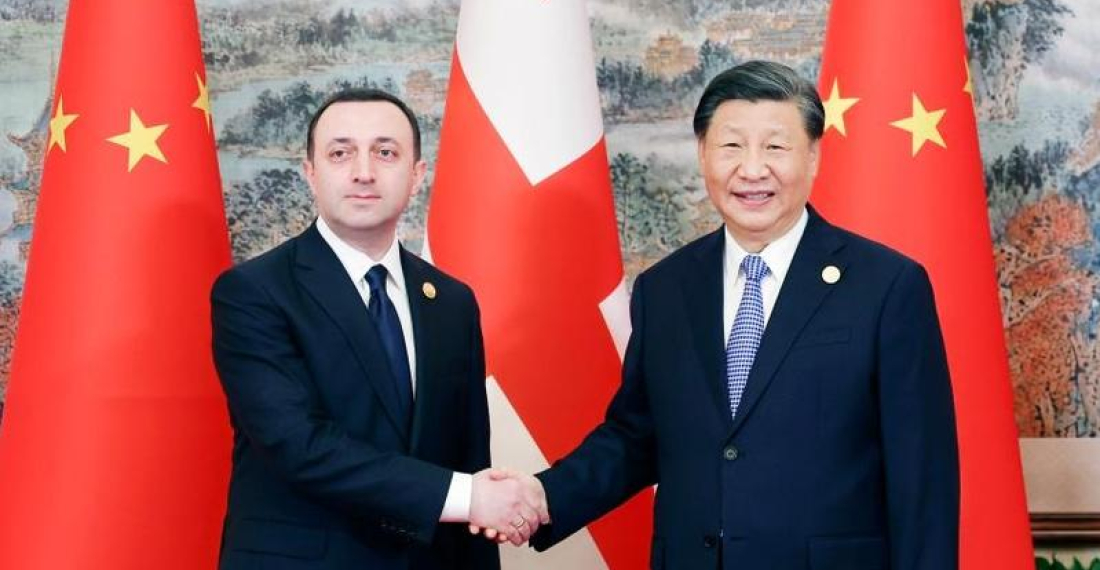In July, Georgian prime minister Irakli Garibashvili, travelled to China to meet President Xi Jinping. In a declaration issued at the end of the visit Georgia and China declared they "regard each other as an important strategic partner and thus regard the deepening of bilateral relations as a priority of their respective foreign policies." In this op-ed for commonspace.eu, Nicholas Chkaidze writes that this was one of several actions which indicate that the current Georgian government is making a pivot towards the east at the same time as it is supposed to be trying to secure for Georgia EU candidate status. He argues that "the policy of the Georgian government, while aimed at pleasing everyone by playing on both sides, risks incidentally alienating Tbilisi from its current allies even without much gain."
Since Russia's brutal and unprovoked invasion of Ukraine, the Georgian government has adopted a cautious foreign policy vis-à-vis Russia. What seemed to be at first adoption of a multipolar foreign policy and neutrality has, in a sense, developed into a rapid increase in anti-Western rhetoric by the government, including through complacency towards Russia's encroachment on Georgia, criticizing Ukraine and its government, and flirting with China – especially considering the recent declaration of a strategic partnership with the latter. Given all this we can say that the Georgian Dream is making a pivot to the East, which may have strategic consequences for Georgia's path of development.
Furthermore, during the meeting between the Chinese and Georgian government officials in July, the Georgian side made suggestions about the future Chinese participation in fields that are extremely important and sensitive to the European Union and the United States. Investing in the significantly strategic Anaklia deep sea port and 5G wireless communications was explicitly discussed. Therefore, the current government's actions do not align well with the declared intention of joining the EU.
The Associated Trio (Ukraine, Moldova and Georgia) viewed the ongoing war in Ukraine as a historic opportunity to fundamentally integrate themselves into the European Union. Nevertheless, the Georgian Dream's deliberate maneuverings hindered Georgia's chances of becoming an EU candidate country.
More than a year ago Georgia received 12 conditions from the EU on which depended the decision in candidate status, which is now due by the end of 2023. Only one of them has been fully implemented (actively taking into account rulings of ECHR), two are mostly fulfilled (combat against gender inequality, organized crime, and harassment of women), seven are partially implemented (electoral and institutional reforms, independent judiciary, anti-corruption measures, media environment, protection of human rights of vulnerable groups, involvement of CSOs in the decision-making process, and independent ombudsman and institution independence of the PD office), and two priorities - political depolarization and de-oligarchization, haven't been implemented at all.
The recent visit of Josep Borrell, the EU's top diplomat, to Tbilisi showcased that the EU is trying to go for a "last push" to bring Georgia into its community and to remind them that this historic opportunity shouldn't be missed, but should be earned by merit. In response to Mr. Borrell's remarks, the prime minister of Georgia, Irakli Garibashvili, stated that Georgia demands "just treatment," stating that "the bonus status" was given to Moldova and Ukraine last year "despite their failure to entirely fulfill recommendations."
The Georgian leadership could be purposely attempting to have Georgia's candidate status rejected by the EU, so as to cast blame on Brussels for being unreliable and having no actual intention of accepting Georgia, which will give them more space for maneuvering.
At the beginning of the war in Ukraine, we also witnessed that the Georgian government was unwilling to join the EU, the US, and their allies in imposing sanctions on Russia. Georgia's rapprochement with Russia is also reflected in much closer economic cooperation, skyrocketing numbers of tourist visits for Russians, and the resumption of direct flights after a ban that had lasted four years before being lifted by Vladimir Putin in May this year.
This decision was made amid increasing criticism of the Georgian government by the West, further exacerbated by the popular narrative of the Georgian Dream's leadership that the West wants to "open up a second front of the war with Russia in Georgia." Prime Minister Irakli Garibashvili also uses the message box of the Russian government, blaming NATO expansion as the primary reason for the war in Ukraine, which is an alarming statement and a deliberate effort to undermine the approval rating of NATO in Georgia, and which will naturally hurt Georgia's Euro-Atlantic integration process.
Furthermore, what was considered an accusation by the government of Ukraine about Georgia helping Russia to evade sanctions a year ago is now proved and solidified by the June 2023 report of the Office of the Director of National Intelligence of the United States, where it says that "most of the cargo ships used to transport Ukrainian grain in 2022 out of Russian-occupied areas were Russian", which would eventually be shipped to several locations, including the port of Poti, Georgia.
Even though it cannot be confirmed whether or not the Georgian side knew about where the grain came from, it says a lot about the nature of conducting business with the Russians.
The policy of the Georgian government, while aimed at pleasing everyone by playing on both sides, risks incidentally alienating Tbilisi from its current allies even without much gain. Given that the majority of Georgians see themselves as an inalienable part of the West, the EU’s decision as to whether or not to grant Georgia the candidate status will significantly influence the country's long-term political prospects.






